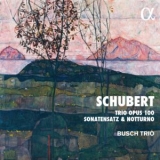 Franz Schubert: Trio op. 100 D 929 + Sonatensatz D 28 + Notturno D 897; Busch Trio; 1 CD Alpha 632; Aufnahme 02/2019, Veröffentlichung 11/2020 (65’47) - Rezension von Alain Steffen
Franz Schubert: Trio op. 100 D 929 + Sonatensatz D 28 + Notturno D 897; Busch Trio; 1 CD Alpha 632; Aufnahme 02/2019, Veröffentlichung 11/2020 (65’47) - Rezension von Alain Steffen

‘Schuberts Lichtblitz in der Dunkelheit’, so übertitelt Tully Porter den Booklet-Text zu dieser CD. Und es ist genau das, was diese Interpretationen von Schuberts zwei Klaviertrios D 28 & D 929 kennzeichnet. Das Busch-Trio mit Mathieu van Bellen, Violine, Ori Epstein, Cello und Omri Epstein, Klavier, geht diese beiden Werke relativ optimistisch und dynamisch an. Das vorwärtsdrängende, kommunikationsfreudige Spiel der drei Musiker bringt Schuberts Es-Dur Trio so richtig zum Leben und lässt das tragische Schicksal des Komponisten etwas vergessen. Trotzdem werden auch die seelischen Tiefen und Schuberts Verzweiflung berücksichtigt. Die Musik, die im Todesjahr des Komponisten entstand, erscheint uns aber in der Interpretation des Busch Trios durchaus versöhnlich. Vor allen verstehen es die Musiker, die Qualität der Musik in den Mittelpunkt zu stellen und somit Schubert als legitimen Nachfolger Beethovens darzustellen.
Makellos ist auch die Interpretation des Sonatensatzes D 28, der eventuell der langsame Satz eines geplanten 3. Klaviertrios hätte sein können. Auch hier begeistern die Buschs mit expressiver Darstellung und einem betörend schönen Spiel. Schuberts Notturno D 897 beschließt diese CD auf allerhöchstem Niveau.
‘Schubert’s flash of lightning in the darkness’, that’s how Tully Porter titles the booklet text for this CD. And this precisely characterises these interpretations of Schubert’s two piano trios D. 28 & D. 929. The Busch Trio with Mathieu van Bellen, violin, Ori Epstein, cello and Omri Epstein, piano, plays these two works with a certain optimism and dynamism. The propulsive, communicative playing of the three musicians really brings Schubert’s E-flat major trio to life and makes one forget the composer’s tragic fate somewhat. Nevertheless, the emotional depths and Schubert’s despair are also taken into account. However, the music, which was written in the year of the composer’s death, seems quite reconciliatory in the Busch Trio’s interpretation. Above all, the musicians focus on the quality of the music and thus present Schubert as a legitimate successor to Beethoven.
The interpretation of the Sonata Movement D. 28, which could possibly have been the slow movement of a planned 3rd piano trio, is also flawless. Here, too, the Buschs inspire with expressive performance and beguilingly beautiful playing. Schubert’s Notturno D. 897 concludes this CD at the very highest level.
























